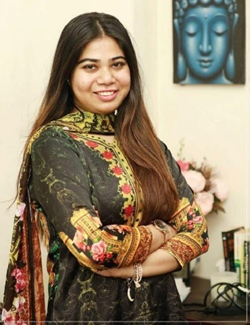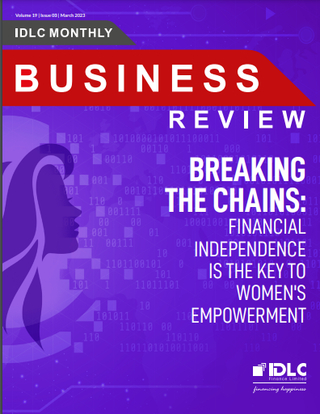
Expert Opinion on Cover Story
Interviewed by Syed Md. Rakeen, Team MBR
Esrat Karim is the founder and director of the AMAL Foundation and has been an advocate for social reform and women’s empowerment since before her foundation was established in 2014. As a result of her work in education, emergency response, health, and women’s empowerment, she was honoured by Forbes in 2020 as one of Asia’s top 30 under 30 social entrepreneurs. She completed her bachelor’s degree in finance from the University of Dhaka and her master’s degree in social entrepreneurship from the University of Colorado. As an Acumen Fellow, she is running skill centres for women in different remote areas of Bangladesh. Team MBR was in a conversation with Ms. Esrat Karim and was fortunate enough to receive her take on women’s empowerment.
Syed Md. Rakeen: Women are doing well and getting to the top in every field these days, including IT, banking, RMG, and so on. What factors do you think are fueling this empowerment?
Esrat Karim: There are many factors that are fueling women’s empowerment, but the right to education is one of the most important means of empowering women because it enriches them with knowledge, skills, and self-confidence. It helps them respond to opportunities to challenge their status quo and change their life circumstances. Besides, it increases their confidence, which eventually helps them take on leadership roles.
Syed Md. Rakeen: Though some communities still view women’s empowerment as taboo, the views of most people towards women’s empowerment have changed a lot, and family members of working women are now more supportive than ever. What can be done to bring everyone under the same umbrella and ensure everyone’s support for women’s empowerment?
Esrat Karim: I believe that the mentality must shift. Most of the time, women are regarded as a burden rather than a valuable asset. Every woman is capable of leading a country. They have the strength. They just require mental support from their family, friends, and others around them. Only a positive mindset and attitude can bring everyone under the same umbrella. It will also guarantee that women’s empowerment is supported.
Syed Md. Rakeen: According to World Bank estimates, the female labour participation rate in Bangladesh as of 2021 is 35%, while the male labour participation rate is 79%. Why do you think women are lagging far behind men in terms of labour force participation?
Esrat Karim: Women’s low labour participation is one of the primary reasons why women are denied the opportunity to be empowered. Women in developed countries are travelling to the moon in the twenty-first century, yet women in our nation are not even obtaining a living wage. Every day, they must battle for a harassment-free workplace. They tend to be more anxious. They do not enjoy prospects for progress, and they suffer a lack of flexibility and work stability. In addition, women are lagging behind because of less support from their families and surroundings.
Syed Md. Rakeen: A report that came out recently in a well-known Bangladeshi newspaper said that a 10% rise in the number of women working could boost economic growth by 3.1%. What specific initiatives can be taken to promote women’s employment in Bangladesh so that the country can enjoy enhanced economic growth?
Esrat Karim: We need to implement good practises for increasing women’s contribution to the nation’s formal economy through advancing women’s economic empowerment using multiple channels, such as removing constricting gender norms and stereotypes, removing structural barriers to women’s productive economic participation, creating institutional mechanisms to help young women plan their childcare, and so on. Besides, encouraging and educating female students on the significance of financial independence is also important.
Syed Md. Rakeen: Nearly 12.7% of female employees experience sexual harassment at work, according to a study by Karmojibi Nari and CARE Bangladesh. What measures can be undertaken, in your opinion, to ensure safety for women in the workplace?
Esrat Karim: The workplace for women should be made safe by organisations. Any action that threatens women’s physical and mental safety should be viewed as unacceptable. Even verbal abuse needs to be taken into account. Strong action must be taken to stop any harassment of women. A zero-tolerance policy should be implemented by organisations to prevent the harassment of women. Firms/organisations must act immediately if a female employee is being harassed. Also, this would raise awareness of the situation, particularly among female employees. Before moving on to a higher level, it might assist them in raising their voice against these unjust practises. Besides, the male colleagues should form support committees and groups to support their female colleagues.
Syed Md. Rakeen: Do you think that women are enjoying equal employment opportunities in Bangladesh? What policies can policymakers implement to ensure that organisations provide equal employment opportunities to women?
Esrat Karim: Well, Bangladesh leads all of Asia in terms of the percentage of women who work. This contradicts the fact that there is a steadily growing gender gap in economic activities. They do not have equal access to opportunities. Every organisation should uphold a gender equality policy that ensures both men and women receive an equitable share of opportunities.
Syed Md. Rakeen: Do you think that financial independence alone can empower women? If not, what other issues should be addressed to create a conducive environment for women’s empowerment?
Esrat Karim: Financial independence is significant, of course. In addition, other issues like the authority of household decision-making, access to credit, participation, knowledge, and awareness, raising voices, freedom, mobility, respect, economic participation, and developing leadership skills need to be addressed in order to create an environment for women’s empowerment.
Syed Md. Rakeen: Women desperately need to break free from their shackles. What are your suggestions for women who want to empower themselves and move forward?
Esrat Karim: I would suggest all young women move forward no matter what comes in front of them. Be confident, take on leadership roles, and give your best. Most of the time, our silence becomes the main villain in our lives. We have to break that shackle. We must stand up for ourselves, whether it is for fair wages, against any kind of harassment, or to make a strong place in the workplace/educational institution. We are the key to our success, and we have to own our rights.

Breaking the Chains: Financial Independence is the Key to Women’s Empowerment
Financial independence is a crucial aspect of women’s empowerment because it enables women to take charge of their lives and make well-informed choices to build a better future for themselves as well as for their families, society, and the country at large. Research from the McKinsey Global Institute shows that the global GDP could grow by USD 12 trillion by 2025 if gender gaps are closed and women are given more economic power.
Women have been deprived of equal access to opportunities as their male counterparts throughout history. Despite comprising 60% of the workforce in the RMG industry of Bangladesh, the dearth of women at the industry’s management level is leading to gender inequality and poor work culture. The gender pay gap has left women with little savings and investments for the future, making them more exposed to economic instability.
Notwithstanding numerous hurdles, women in Bangladesh have made significant progress in recent years in climbing the corporate ladder and gaining leading positions. They have continually broken through boundaries and challenged societal norms. Bangladesh can pave the road to a more equitable and prosperous future for everybody by recognising the value of women’s contributions to the economy and society and giving them equal chances.
Md. Shah Jalal
Editor
IDLC Monthly Business Review